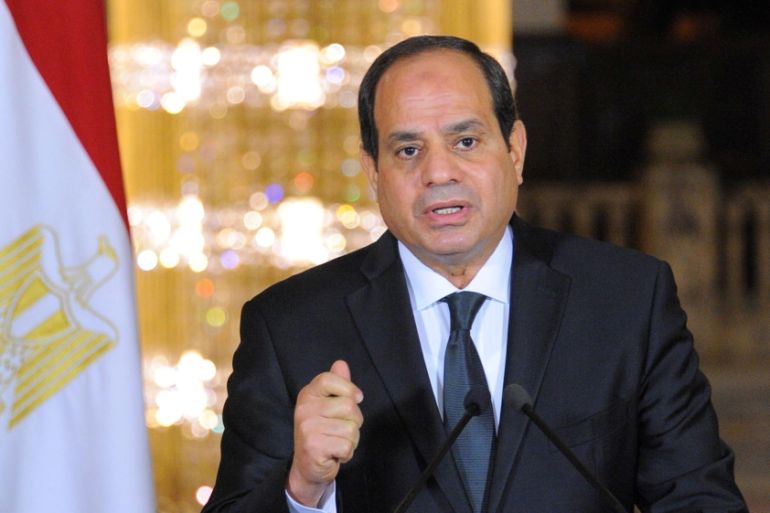The Egypt-US lobbying connection
Relationships between American policymakers and lobbyists could benefit Egypt’s General Intelligence Service.

Washington – Lobbyists working for Egypt’s controversial General Intelligence Service (GIS) have years of experience on Capitol Hill, working for politicians with the power to enact policies on Egypt, documents show.
Earlier this month, Weber Shandwick cut ties with Egypt after an article in The Atlantic explored how a campaign by the DC public relations firm could help the GIS, which is accused of torture, hobbling Egypt’s parliament and stifling dissent.
Cassidy & Associates, a firm whose lobbyists have deep connections with members of the US Congress, was a subsidiary of Weber Shandwick until last month, when it announced it would buy itself from their parent company Intergroup. It will continue to lobby for GIS.
Justice Department filings show that as of January, there were three Cassidy & Associates lobbyists working for GIS: Russell Thomasson, Kai Anderson and Terry Paul. There have been no new filings suggesting a change in lobbyists. The contract between the lobbying firm and Egypt was signed by General Nasser al-Fahmy for his superior, Major General Khaled Fawzy, the GIS director.
READ MORE: Why is Egypt’s new NGO law controversial?
All three of the Cassidy & Associates lobbyists are examples of the “revolving door” between Congress and lobbyists, according to the Center for Responsive Politics.
Jock Friedly, the founder of the government transparency site LegiStorm, told Al Jazeera that there are two types of lobbyists on Capitol Hill: those who are “generally effective” and those “who know the right people”. Higher pay for revolving-door lobbyists suggests it is “very valuable to have connections with powerful members of Congress”, he said.
The Cassidy & Associates lobbyists appear to know the right people. For six years, Anderson was the deputy chief of staff for former Democratic Senate Majority Leader Tom Daschle, who lost a re-election bid in 2004 and went on to become a lobbyist.
Paul was a Marine Corps liaison to the Senate for 10 years before moving on to the Pentagon in 1998, and Thomasson was the chief of staff for Republican Senator John Cornyn until 2015, when he left to join Cassidy & Associates.
All three have connections to the US intelligence establishment. Paul’s experience helped him win big defence contracts for clients “foreign and domestic”. Daschle investigated the September 11 attacks as a former member of the Senate Select Committee on Intelligence and Cornyn was appointed to the same committee in 2017.
|
|
According to Timothy LaPira, an associate professor of political science at James Madison University and co-author of Revolving Door Lobbying, the importance of such lobbyists extends beyond the senators for whom they worked.
“It’s not just that [Thomasson] can call Cornyn – he can, for sure – but he sat through dozens of late-night meetings with other congressmen and chiefs of staff throughout his career,” LaPira told Al Jazeera, noting that this makes Thomasson “worth his weight in gold”.
Even though much time has passed since Paul and Anderson worked with policymakers directly, lobbyists continually renew relationships on Capitol Hill, experts note.
And these relationships could aid Egypt’s goals. The contract between Egypt and Cassidy & Associates, signed by both parties in January, says the firm will showcase “key attributes of [Egypt’s] civil society”, among other image-rehabilitating acts. The firm will receive $50,000 a month, plus fees and expenses.
At the same time, a researcher with Amnesty International – who spoke on condition of anonymity owing to the risks associated with criticising the GIS – told Al Jazeera that Egypt has signed a “death warrant” for NGOs and human rights defenders.
A law initiated by deposed President Hosni Mubarak to crack down on civil society during the Arab Spring is still being used by the Sisi government today to “muzzle freedom of expression, association and assembly in orchestrated efforts to dismantle the country’s human rights movement and crush the slightest signs of dissent”, according to a statement from Amnesty.
OPINION: Sisi’s visit to the US – The hopes and the reality
The GIS has investigated numerous civil society groups, giving ammunition to the Egyptian state’s campaign against them, and many rights defenders have had their assets frozen or been imprisoned, the researcher said. President Abdel Fattah el-Sisi has also signed Law 70, or the NGO law, which places further limits on civil society groups.

In addition, the GIS has been accused of working with the CIA’s “extraordinary rendition” programme, under which suspected extremists were abducted and rendered to a state where they had criminal charges pending. Interrogations did not take place while they were in CIA custody, but that changed after September 11, 2001, when suspects were interrogated in US custody before being transferred to another country for potential torture.
An article about the programme by Louis Fisher, a renowned US Constitution expert, said that victims sent to Egypt by the US were stripped, hanged from a ceiling or doorframe and “beaten with fists, whips, metal rods, or other objects; subjected to electrical shocks; and doused with cold water”. The GIS also reportedly threatened their families.
By the time of publication, Cassidy & Associates had not responded to Al Jazeera’s request for comment on the matter. In a statement earlier this month, the firm said: “Egypt is a long-standing ally of the United States and plays a key role in the fight against terrorism. Cassidy & Associates looks forward to continuing to represent the government of Egypt and highlight this important relationship with policy makers on Capitol Hill and in the administration.”